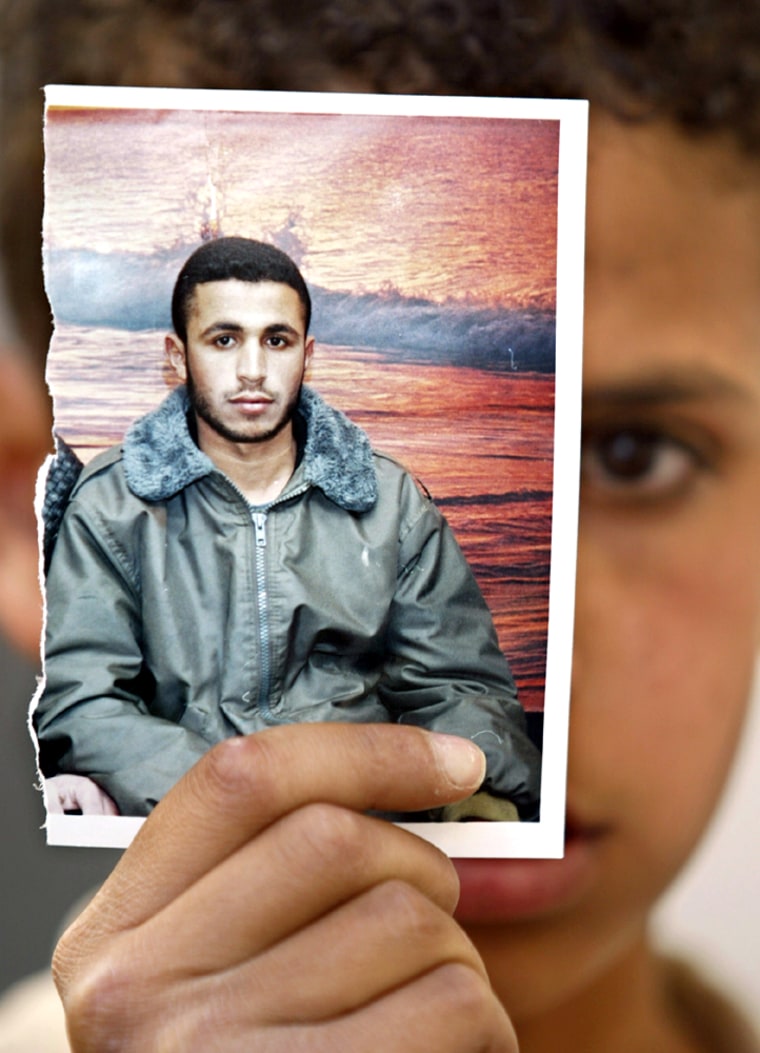Palestinian leader Yasser Arafat on Saturday condemned U.S. support for Israel’s position on two of the thorniest issues in the Mideast conflict, saying no one can negotiate away the Palestinians’ rights.
Meanwhile, a Palestinian suicide bomber blew himself up at an industrial zone between Israel and Gaza, injuring four Israelis, Israeli officials said.
President Bush angered Palestinians when he said Wednesday that Israel would be able to keep some large settlement blocs and would not have to absorb Palestinian refugees under any peace deal.
“No one in this world has the right to give away our land and our rights,” Arafat said in a message broadcast to a rally of about 1,500 people here. “Our people and its leadership are the only ones that can legitimately speak on behalf of our nation.”
Arafat had not directly commented on Bush’s remarks and even Saturday he did not refer to Bush or Sharon by name. Sources inside the Palestinian Authority said Arafat and other leaders were upset by the remarks, but were confused as to how to respond.
Bush also endorsed Israeli Prime Minister Ariel Sharon’s plan to withdraw from the Gaza Strip and a small section of the West Bank.
In response to Bush’s statement, Palestinian Foreign Minister Nabil Shaath said Saturday he had canceled a planned trip to Washington, where he was to meet with Secretary of State Colin Powell and Condoleezza Rice, Bush’s national security adviser, later this week.
Four Israelis hurt in bombing
On Saturday, a Palestinian suicide bomber blew himself up as he was crossing into the Erez industrial zone in the northern Gaza Strip, injuring four Israeli security workers, military officials said.

Hamas and the Al Aqsa Martyrs’ Brigades, a militia affiliated with Arafat’s Fatah movement, claimed joint responsibility and identified the bomber as Fadi Al-Amoudi, 22, from Beit Lahiya.
Israeli rescue services said one of the injured was in critical condition, one was in moderate condition and the other two were lightly wounded. The bomber was killed.
The explosion occurred as the bomber was entering the zone from the Gaza Strip, the army said. About 6,000 Palestinians work in factories producing plastics, textiles, iron and electronics at the industrial park.
“I was drinking tea when I heard the explosion. It shook the whole area,” said Abdullah Hilal, 29, a taxi driver at Erez.
The explosion sent part of the corrugated tin roof of the terminal where Palestinians are checked flying into the air, he said.
The bomber’s father, Ahmed Al-Amoudi, 51, said he was proud of his son’s act but had no idea of his intentions when they had lunch together two hours before the blast.
“Fadi is one of thousands of Palestinians who ... suffer humiliations of occupation, who witnessed the crimes of occupation,” said Al-Amoudi as he held a studio picture of his son standing in front of a picture of the Eiffel Tower. “I think this can bring anyone to sacrifice himself, like my son.”
Al-Amoudi said his son was a supporter of the Fatah movement, and had grown quiet since Israel assassinated Hamas founder Sheik Ahmed Yassin in a missile strike March 22.
Erez, also the main crossing point into Israel, has been a frequent target of attack by Palestinian militants in recent months.
The attack occurred on Palestinians’ annual day of solidarity with prisoners held by Israel.
About 7,000 Palestinians are imprisoned in Israeli jails on suspicion they were involved in violence against Israel. Most were rounded up in army raids during more than three years of fighting.
“Your people will never forget you,” Arafat said of the prisoners. “You are the ones that held up the banner of struggle for the sake of Palestine, for the sake of establishing a Palestinian state with Jerusalem as its capital.”
March in Gaza
In a Gaza City march, parents carried pictures of their imprisoned sons and daughters. Actors dressed as Israeli soldiers and Palestinian prisoners played out scenes on the back of a truck draped with barbed wire, with “soldiers” beating shackled and blindfolded “prisoners.”
Leaders of the militant Hamas and Islamic Jihad groups threatened to kidnap Israeli soldiers as bargaining chips in future prisoner swaps with Israel — a tactic successfully used by the Lebanese guerrilla group Hezbollah.
“There is no policy except the policy of kidnapping soldiers so they can be exchanged with our prisoners,” said Abdullah Shami, the Islamic Jihad leader in Gaza. “This tactic will be used by all the Palestinian factions.”
A Hezbollah prisoner swap with Israel on Jan. 29 resulted in the release of more than 400 Palestinians and other Arabs from Israeli prisons, boosting the group’s standing with the Palestinian public. Hezbollah handed over an Israeli businessman and the bodies of three Israeli soldiers.
In the West Bank city of Hebron, protesters burned U.S. and Israeli flags and chanted slogans “No peace without the release of prisoners.”
In August, Israel freed several hundred Palestinian prisoners to try to improve the atmosphere. The gesture fell flat among Palestinians, who had hoped for a mass release, and said most of those freed had been up for release anyhow. Several dozen of the freed prisoners belonged to the Islamic militant groups Hamas and Islamic Jihad.
Also Saturday, Palestinian intellectuals, Cabinet ministers, and former government officials sent Arafat a letter calling for immediate political and administrative reform within the Palestinian Authority.
“Facing the challenges and the grave dangers ahead cannot be done using the same policies and means,” said the letter, addressed to the Palestinian leadership and Arafat. “There is a need for change.”
The signatories called on the Palestinian leadership to unify all Palestinian security forces — a long-standing demand by the U.S. and Israel — and hold local, legislative, and presidential elections within a year. They said such reforms were the only way “to get out of the current impasse.”